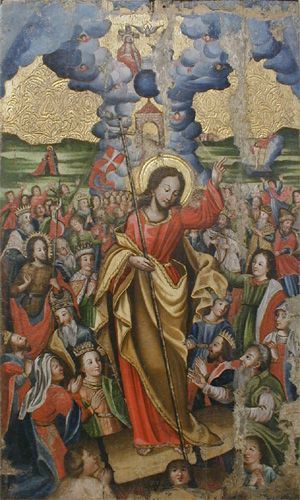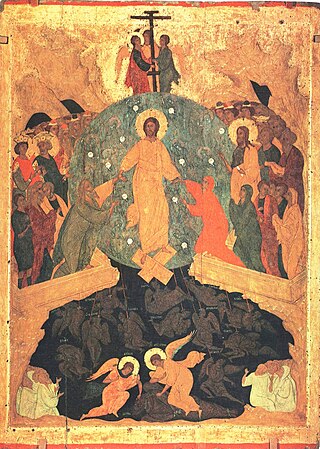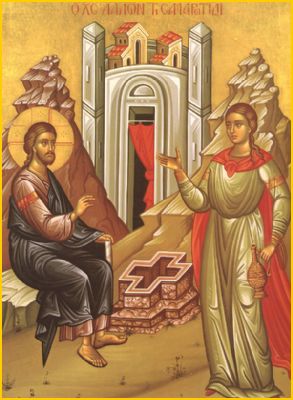
Easter, also called Pascha or Resurrection Sunday, is a Christian festival and cultural holiday commemorating the resurrection of Jesus from the dead, described in the New Testament as having occurred on the third day of his burial following his crucifixion by the Romans at Calvary c. 30 AD. It is the culmination of the Passion of Jesus Christ, preceded by Lent, a 40-day period of fasting, prayer, and penance.

Great Lent, or the Great Fast, is the most important fasting season of the church year within many denominations of Eastern Christianity. It is intended to prepare Christians for the greatest feast of the church year, Pascha (Easter).

The liturgical year, also called the church year, Christian year or kalendar, consists of the cycle of liturgical seasons in Christian churches that determines when feast days, including celebrations of saints, are to be observed, and which portions of Scripture are to be read either in an annual cycle or in a cycle of several years.

Holy Week is the most sacred week in the liturgical year in Christianity. For all Christian traditions, it is a moveable observance. In Eastern Christianity, which also calls it Great Week, it is the week following Great Lent and Lazarus Saturday, starting on the evening of Palm Sunday and concluding on the evening of Great Saturday. In Western Christianity, Holy Week is the sixth and last week of Lent, beginning with Palm Sunday and concluding on Holy Saturday.

Easter Monday is the second day of Eastertide and a public holiday in some countries. In Western Christianity it marks the second day of the Octave of Easter; in Eastern Christianity it marks the second day of Bright Week.

Holy Saturday, also known as Great and Holy Saturday, Low Saturday, the Great Sabbath, Hallelujah Saturday, Saturday of the Glory, Sábado de Gloria, and Black Saturday or Easter Eve, and called "Joyous Saturday", "the Saturday of Light", and "Mega Sabbatun" among Coptic Christians, is the final day of Holy Week, between Good Friday and Easter Sunday, when Christians prepare for the latter.

The Paschal Triduum or Easter Triduum, Holy Triduum, or the Three Days, is the period of three days that begins with the liturgy on the evening of Maundy Thursday, reaches its high point in the Easter Vigil, and closes with evening prayer on Easter Sunday. It is a moveable observance recalling the Passion, Crucifixion, Death, burial, and Resurrection of Jesus, as portrayed in the canonical Gospels.
The Octave of Easter is the eight-day period, or octave, that begins on Easter Sunday and ends with Second Sunday of Easter. It marks the beginning of Eastertide. The first seven of these eight days are also collectively known as Easter Week.

Eastertide or Paschaltide is a festal season in the liturgical year of Christianity that focuses on celebrating the Resurrection of Jesus Christ. Preceded by Lent, it begins on Easter Sunday, which initiates Easter Week in Western Christianity, and Bright Week in Eastern Christianity.
The Eastern Orthodox liturgical calendar describes and dictates the rhythm of the life of the Eastern Orthodox Church. Passages of Holy Scripture, saints and events for commemoration are associated with each date, as are many times special rules for fasting or feasting that correspond to the day of the week or time of year in relationship to the major feast days.
The Paschal cycle, in Eastern Orthodox Christianity, is the cycle of the moveable feasts built around Pascha (Easter). The cycle consists of approximately ten weeks before and seven weeks after Pascha. The ten weeks before Pascha are known as the period of the Triodion, referring to the liturgical book that contains the services for this liturgical season. This period includes the three weeks preceding Great Lent, the "pre-Lenten period", the forty days of Lent, and Holy Week. The 50 days following Pascha are called the Pentecostarion, also named after the liturgical book.
Orthros or útrenya, in the Byzantine Rite of the Eastern Orthodox Church and the Eastern Catholic Churches, is the last of the four night offices, the other three being vespers, compline, and midnight office. Traditionally, in monasteries it is held daily so as to end immediately following sunrise, in contrast to parishes where it is held only on Sundays and feast days. It is often called matins after the office it most nearly corresponds to in Western Christian churches.

Easter Saturday, on the Christian calendar, is the seventh day of Eastertide, being the Saturday of Easter or Bright Week. In the kalendar of Western Christianity it is the last day of Easter Week, sometimes referred to as the Saturday of Easter Week or Saturday in Easter Week. It is the seventh day in the Octave of Easter too. In the liturgy of Eastern Christianity it is the last day of Bright Week, and called Bright Saturday, The Bright and Holy Septave Saturday of Easter Eve, or The Bright and Holy Septave Paschal Artos and Octoechoes Saturday of Iscariot's Byzantine Easter Eve. Easter Saturday is the day preceding the Second Sunday of Easter.

Bright Week, Pascha Week or Renewal Week is the name used by the Eastern Orthodox and Byzantine Rite Catholic Churches for the period of seven days beginning on Easter and continuing up to the following Sunday, which is known as Thomas Sunday.

The Pentecostarion is the liturgical book used by the Eastern Orthodox and Byzantine Catholic churches during the Paschal Season which extends from Pascha (Easter) to the Sunday following All Saints Sunday.
The Fifth Sunday of Easter is the fifth Sunday of the Easter season, being four weeks after the Christian celebration of Easter Sunday. In Western Christianity, this day is also known as the Fourth Sunday after Easter or Cantate Sunday. Eastern Christianity also calls this day the "Fifth Sunday," but typically using an Eastern synonym for Easter; for example, Fifth Sunday of Holy Pascha or Fifth Sunday of the Resurrection. In the Byzantine Rite, this day is also known as the Sunday of the Samaritan Woman.
The Second Sunday of Easter is the eighth day of the Christian season of Eastertide, being the seventh after the celebration of Easter Sunday. Those churches which give special significance to this day recognize it by various names. In the Catholic Church, this day is generally known as Divine Mercy Sunday. Across Western Christianity more broadly, this day is also known as the Octave Day of Easter, White Sunday, QuasimodoSunday, Bright Sunday, and Low Sunday. In Eastern Christianity, this day is known as Antipascha, New Sunday, and Thomas Sunday.
The World Council of Churches proposed a reform of the method of determining the date of Easter at a summit in Aleppo, Syria, in March 1997.











